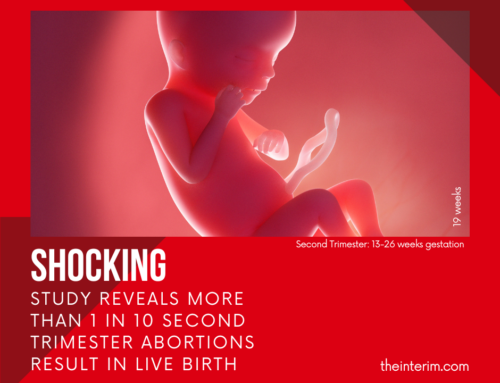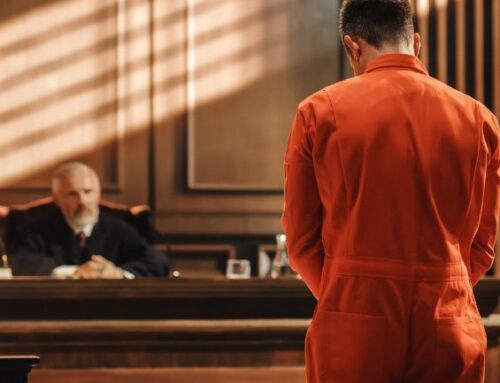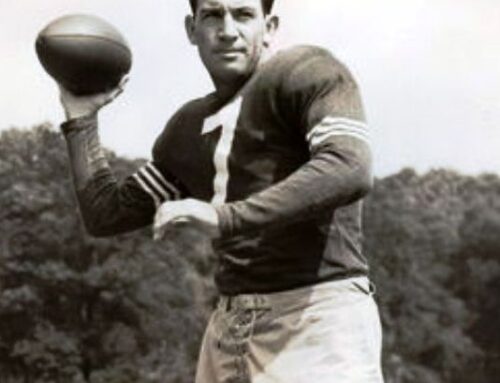Frank Mountain is going back to school this fall to teach history and religion to his grade eight kids at Frank Ryan Senior Elementary School in Ottawa. After 33 years of teaching full-time, he’ll mornings only this year because of his new way of life. He’s in a wheelchair now, the result of a serious car accident on June 5, 1988, when his neck was broken. The family was driving to Ottawa to picket against abortions being done at the Ottawa Civic Hospital, when their car overturned at a construction site not far from home. This trip had been their routine for the past four years, but since that day, just over a year ago, Frank had been recuperating in hospital – but is now at home. Although his physical activity is diminished, his mind and spirit are as busy and bright as ever. He’s eager to get back to school to his kids, and this year he’ll be home for Thanksgiving.
Reaction to accident
Frank’s immediate reaction after the accident was to eye his scapular medal, to recite his Act of Contrition and, incredibly, to think, “I can still picket from a wheelchair.” Feeling no sensation in his lower limbs, he knew his injuries were serious. Miraculously, no one else was hurt. When doctors at the hospital told him that he would not walk again, he recalls, “I was never really shocked.” Nor did he go into anger or depression as the hospital staff and others expected. Of his acceptance, he says, “I used to teach my (school) kids that the good Lord gives you gifts: to walk, to speak, to see, to talk. But, one day, He might change His mind and give you a different gift, like not being able to walk, to speak, to see, to talk, because He gives you different gifts for different reasons. The kids were shocked. They never thought of life in those terms.” Hastily, he adds, “Of course, I never expected this to happen to me either, but when it did, I guess I had thought about it before, so it wasn’t such a shock.”
Frank remembers his old gift of being able to move his limbs. He says his only real frustrations now are his physical limitations: not being able to reach for the salt or to light his own cigarette; or to garden or to renovate the house; or his extreme sensitivity to temperature changes and the muscle spasms in his legs, for which he refuses medication, saying, “If I think about something else, they pass.”
Still, last year was a disruptive year, with hospitalization and rehabilitation for Frank and re-organization of normal family routines and extensive home renovations for the family.
Finally, on December 16, 1988, Frank came home from hospital. Margie, his wife, says, “The best gift of all was having Frank home for Christmas.”
Amazing resiliency
A visit with Frank, aged 55 years, and Margie, aged 44, and their five children – Matthew-John, aged ten; Timothy, aged eight; Mary Ann, aged seven; Mary Teresa, aged five; and David, aged three years – is to be temporarily adopted into their family. They live in North Gower, in a country setting, one hour south of Ottawa. Here, the five children buzz in and out all afternoon, reporting the discovery of a newly-found frog, or who is up in the treehouse now, or sharing a new drawing of the family, or that Matthew-John outside cutting the grass on the small tractor, has become unhitched from his trailer. All report back and forth to Frank. All activity centers around him. Although he cannot physically participate, still he dispenses humour, wisdom, discipline and direction from his wheelchair, like Moses from the Mountain. The system works well, for the children are delightful and well-behaved. But then, Margie plays a part, too.
Solid as a gem
Affectionately, Frank describes Margie as bright and solid as a gem. “She never gets upset and is so consistent.” Canny, too, for the day I visited them she was selling an unused garage door and bargained until she got her price. Amused, Frank says, “I’d probably give it away at the first offer, but not her. She’ll hang on to the end.” Tenacious Margie did just that.
Margie runs her house like a benevolent drill sergeant – with precision, efficiency and good humour. Constantly attentive to the whereabouts of the children and to Frank’s needs, she not only teaches her children at home in a “homeschooling program,” but she also does all nursing care for Frank, enabling him to be at home.
Of the accident, Margie explains that she was a teacher of physically-handicapped children for ten years in Ottawa before and after marriage. Those years acquainted her with life-support systems, tubes and wheelchairs; and she was not intimidated by the technology used in Frank’s rehabilitation. Yet she recalls how she had to pass by the kidney dialysis unit to visit Frank in hospital. Here she would count her blessings that Franck did not need this service, but was glad it was available in Ottawa for those who did. She says, “I knew from past experience that life didn’t end because someone was in a wheelchair.” With eyes welling, she quiety continues, “If Frank has to be in a wheelchair, then I can’t think of anyone I’d rather be with at home.” Then, she adds brightly, “Besides, we haven’t given up on a miracle. It didn’t happen yesterday, but it might tomorrow.”
Solid as a rock
Frank and Margie met at university night school. They were married 17 years ago. Following high school, Frank studied briefly for the priesthood, but decided he did not have a vocation, so he became a teacher. He is one of eight surviving children, whose father was a Cape Breton coalminer, who worked for 50 years until an accident disabled him. Frank remembers his father as a wise, gentle man of deep faith, who always said he was glad to go to work every morning in the mines. Energetic Margie is one of eight children raised on a farm outside Toronto. Her closely-knit family flocked to the side after the accident, taking the children to Brampton for the summer and enabling her to spend all her time with Frank during his early recovery. The couple’s faith and commitment to family has a long history.
Harvest of blessings
Frank and Margie are amazed at the outpouring of love the family received after the accident. For example, passerby at the accident site came by the next day with supper, and people they had never met “telephoned to ask about Mr. Mountain.” After a brief story in the Campaign Life Coalition newsletter, thousands of letters poured in, many with money, all of which Margie answered by hand. Fund-raising events abounded; Frank’s “kids” in grade eight raised several hundred dollars; staff and students at his school raised enough money for a specially-equipped van; Ottawa Action Life had an Irish cabaret night, raising several thousand dollars, as did several parishes, the local community and “homeschool parents.” At Thanksgiving, one class at Frank’s school organized a “Turkey Trot of Hope” for money. Then on a later weekend, the teachers and kids descended upon the house to help Margie by bringing in and stacking wood and moving and re-arranging furniture to accommodate space for an elevator to be installed by a neighbour. Another neighbour rewired their house so Frank could manage the electricity, while another tore out the deck and replaced it with a ramp. The school board donated a computer which Frank can operate by voice.
Of these blessings, Margie says, “If the Good Lord gives you a heavy burden, He always gives you the people to help.”
Mother Teresa’s visit
On September 16, 1988, Jim Hughes organized a surprise hospital visit from Mother Teresa for Frank. “Before I knew what was happening,” Frank says, “she was standing in front of me, a little tiny woman. I can’t tell you what it meant to me. Somehow she concentrates only on the person she talks to and there is such a feeling of peace about her.” For example, the man in the next bed to Frank had given up hope. He had stopped eating. But the day after Mother Teresa’s visit, he was in the hallways talking about her. Probably he needed the spiritual lift more than Frank did.
Mother Teresa told Frank that he would gain strength in his arm – and he has. And she told him, “You are so fortunate; you have been chosen to share in Christ’s Passion.” And quietly, Frank says, “That’s the only way you can look at it; otherwise the whole effort is useless.” And so Mother Teresa’s gift to Frank was precious. She revealed a deeper meaning of his tribulations.
Today, Margie and Frank look brightly ahead. To those of us whose limbs are unimpaired, they can teach us much about patience, endurance, hope and humour, for they have transformed adversity into acceptance. As for the present, Frank says, “We take one day at a time, count our blessings and keep our faith.”
This kind of faith can move mountains, but the Mountains of North Gower can move faith, too, just by the example of their lives.
To Frank and Margie and children, a harvest of blessings on this Thanksgiving.




